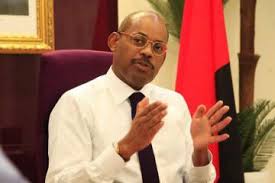Angola has unveiled plans to loosen its currency peg to the dollar by establishing a band in which the kwanza can float freely.
The country’s central bank governor, Jose de Lima Massano, who disclosed the plan during a chat with journalists today in Luanda, said that the possibility of a currency depreciation is “great for the reasons we know,” adding that “we have an exchange rate that does not reflect the truth.”
A news report by Bloomberg noted that Angola has been struggling to cope with lower crude prices since mid-2014 which led to zero economic growth in 2016 and resulted in a sharp drop in the country’s foreign-currency reserves.
The kwanza is currently pegged at around 166 per dollar but trades at more than 400 per dollar in the black market.
The more liberal currency regime comes just four months after President Joao Lourenco replaced Jose Eduardo dos Santos at the helm of Africa’s second-biggest oil producer.
The report quoted Massano as saying that while the central bank won’t make the range public, it will intervene with “corrective measures” if the kwanza floats outside that range. He confirmed that the float will start before the end of this first quarter.
According to data compiled by Bloomberg, the country’s foreign-exchange reserves had dipped to $14.2 billion in November from $15.4 billion in October, and are down more than a quarter from $20 billion at the start of 2017.
Currently, the dollar shortage has left hundreds of companies struggling to pay foreign workers and overseas suppliers, prompting many to leave the import-dependent southern African country.
However, the monetary authorities have vowed to crack down on black-market currency traders to try to narrow the gap between the formal and the informal exchange rate. To stem the flow of scarce currency out of the banking system, Angola has imposed limits on the transfer of dollars and other currencies abroad.
In his remarks during the media conference, the Finance Minister, Archer Mangueira, said that Angola will make efforts to renegotiate domestic and foreign debt in a bid to reduce the burden on government finances.
He explained: “We’re developing efforts to renegotiate our debt with our main partners throughout 2018,” he said. The nation’s foreign debt is $38 billion and renegotiating the maturities and interest rates of liabilities is a “priority.”
To mitigate the negative impact of the dollar shortage on the economy, the minister said that the government may issue foreign and domestic debt if the need arises.
Mangueira said the government was carrying out a “diagnosis” of the country’s $5 billion sovereign wealth fund after reports last year about alleged mismanagement of the Fundo Soberano de Angola’s finances






